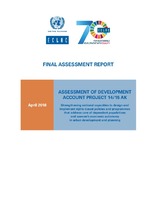UNDP works in some 170 countries and territories, helping to achieve the eradication of poverty, and the reduction of inequalities and exclusion. We help countries to develop policies, leadership skills, partnering abilities, institutional capabilities and build resilience in order to sustain development results.
Inclusive growth, better services, environmental sustainability, good governance, and security are fundamental to development progress. We offer our expertise in development thinking and practice, and our decades of experience at country level, to support countries to meet their development aspirations and to bring the voices of the world’s peoples into deliberations.
In 2016, UNDP is continuing its work to support the 2030 Agenda for Sustainable Development and the 17 new Sustainable Development Goals (SDGs), or Global Goals, as they help shape global sustainable development for the next 15 years.
UNDP focuses on helping countries build and share solutions in three main areas:
In all our activities, we encourage the protection of human rights and the empowerment of women, minorities and the poorest and most vulnerable.
Members:
Resources
Displaying 16 - 20 of 362Community Approaches to Sustainable Land Management and Agroecology Practices
As of 2017, SGP has awarded over 3,800 small grants to land degradation projects in over 120 countries, many of which are in regions with extreme levels of poverty and food insecurity across Africa and Latin America. Africa, in particular, is experiencing the highest population growth of the developing world, while being exposed and vulnerable to the rising impact from climate change.
Resilience for Sustainable Development in the Lake Chad Basin
The humanitarian crisis in the Lake Chad Basin (LCB) is among the most severe in the world, with more than 10 million people in urgent need of life-saving assistance and protection. As the crisis enters its ninth year, attacks by non-state armed groups remain frequent, and the violent conflict continues to fuel large-scale human suffering, including massive violations of human rights, especially for women and girls, who are often victims of abuse and sexual violence. Communities and individuals in the LCB, especially women, are accustomed to shocks and
Resilience for Sustainable Development in the Lake Chad Basin
The humanitarian crisis in the Lake Chad Basin (LCB) is among the most severe in the world, with more than 10 million people in urgent need of life-saving assistance and protection. As the crisis enters its ninth year, attacks by non-state armed groups remain frequent, and the violent conflict continues to fuel large-scale human suffering, including massive violations of human rights, especially for women and girls, who are often victims of abuse and sexual violence. Communities and individuals in the LCB, especially women, are accustomed to shocks and
Final assessment report. Assessment of development account project 14/15 AK: Strengthening national capacities to design and implement rights-based policies and programmes that address care of dependent populations and women’s economic autonomy in urba...
Project ROA 293-9 "Strengthening national capacities to design and implement rights-based policies and programmes that address the care of dependent populations and women’s economic autonomy in urban development and planning"
Listening to our Land: Stories of Resilience
Productive land is a critical natural asset for rural communities in developing nations, providing them with a wide range of ecosystem resources, such as water, fertile soils, plant and genetic diversity – on which they depend daily for survival. For many communities, the land is also an integral part of their cultural identity, helping to maintain social cohesion and stability, in addition to building resilience to socio-ecological shocks and risks such as those caused by climate change. But land is a vulnerable resource that must be managed and restored to ensure a sustainable future.





